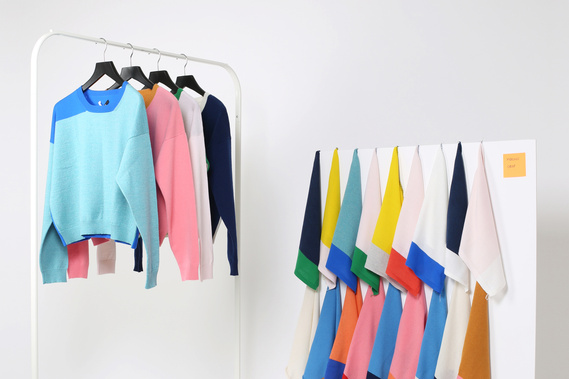Reinventing the Knitwear Industry
No more exploitation of labour, no more polluting transport, no more waste.
This is the world - Unmade.
WORDS Aya Noel
Imagine an age of hyper-personalisation, where clothing is made for and co-designed by the individual client. Now imagine that, instead of visiting a tailor, all you need to do is click your mouse for that unique piece to be created. This is what London-based brand Unmade has been working on since 2012, when they invented an algorithm that allows the client to order custom-made knitwear online. By adding digital to the bespoke, founders Kirsty Emery, Ben Alun-Jones and Hal Watts are rethinking the way fashion is designed, produced and consumed.
“To me it was essential that our system is sustainable, even if it’s not necessarily the best way to sell things to consumers,” co-founder Ben explains with the rapid and excited voice that comes with start-ups, new ideas and fast thinking. “One of the advantages of our technology is that we can track where everything is manufactured, which gives us the opportunity to actually look into the supply chain.” Every piece is produced in Somerset House in London at the exact moment the client orders his design online.
This ensures zero waste, firstly because garments are only produced when they are sold (which means there is never any surplus stock), but also because the consumer is less likely to throw his one-of-a-kind sweater away after just a few wears. As the consumer becomes part of the design process, they become aware of what happens to a piece before they buy it. The consumer is engaged and the company offers complete transparency. In short, the exact opposite of disposability in the fast-fashion cycle.
Engineers Hal and Ben realised the technological potential of knitwear after working on custom-made jumpers for the British Olympic team. “What’s very different and offers a huge opportunity with knitwear, is that you don’t have anything until you make the actual product. You start from the yarn and make something directly.” This is when they contacted knitwear designer Kirsty and founded the brand. It is interesting that this young tech-based brand chose to work with one of England’s oldest and most traditional industries. “The knitwear industry exists for such a long time, which makes it interesting, because there’s so much knowledge inside of it. You don’t get that in any other industry.”
All of the founders graduated at the Royal College of Art, but only Kirsty has a traditional fashion background. As a result the team is naturally disruptive of the fashion system. As outsiders they haven’t felt the need to adapt to the existing structures. “Different backgrounds definitely means different perspectives, which has enabled us to imagine different possibilities from what has been done before.” Though the Unmade philosophy is about questioning and changing the industry, the crew is too modest to call themselves rebels. “We didn’t set out to rebel against the status quo, we just found this really interesting opportunity with technology to change the way people buy and make and sell clothes.”
Unmade doesn’t work with seasons. They feel no need to mindlessly follow the fast-paced rhythm of the domineering fashion calendar. “On our website we release it whenever we have a really nice design or something that we like to show. Because we don’t hold stock, we’re not so constrained by any of the seasons.”
The brand also works as a platform for other brands. Unmade regularly collaborates with designers and artists to introduce new patterns and as a way to exchange ideas with other creatives. “Me and Ben are not experienced clothes designers, so every time we work with a fashion designer we learn something new. For us, it’s not interesting to work with a designer if we don’t think we’re going to learn something new from them.”
However, the primary focus of their company is aimed at other businesses. The team is working on licensing the technology and providing it as a service to large fashion brands, which opens up a whole new range of possibilities. In the long run, the company is looking to adapt the technology to other techniques and other garments. This means that in a few years, your whole wardrobe might be available right beneath your fingertips as you browse the internet. No more exploitation of labour, no more polluting transport, no more waste. This is the world Unmade.
www.unmade.com



